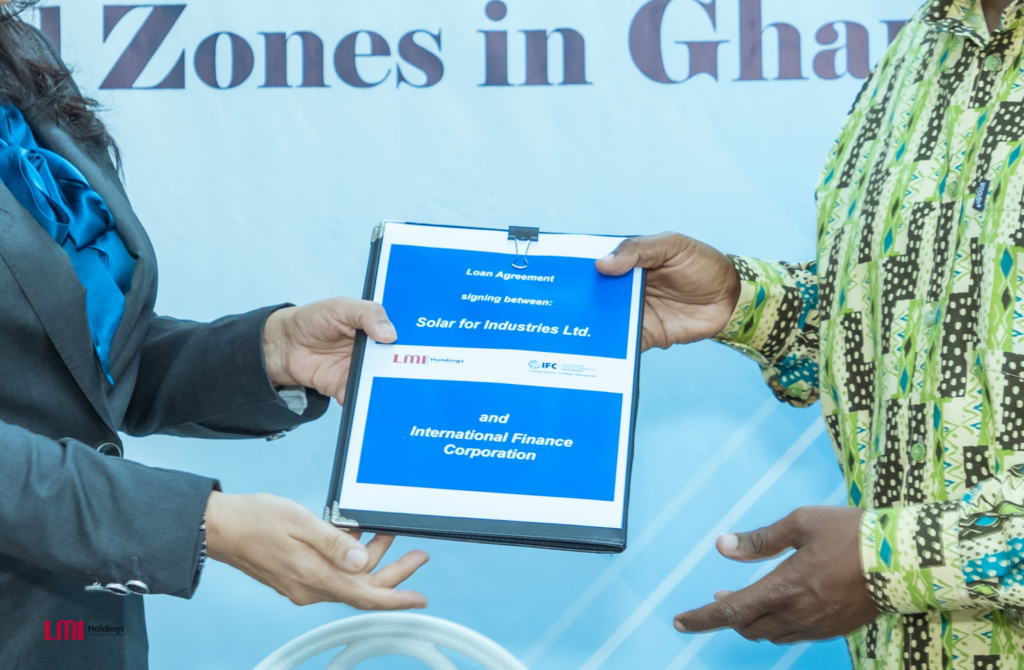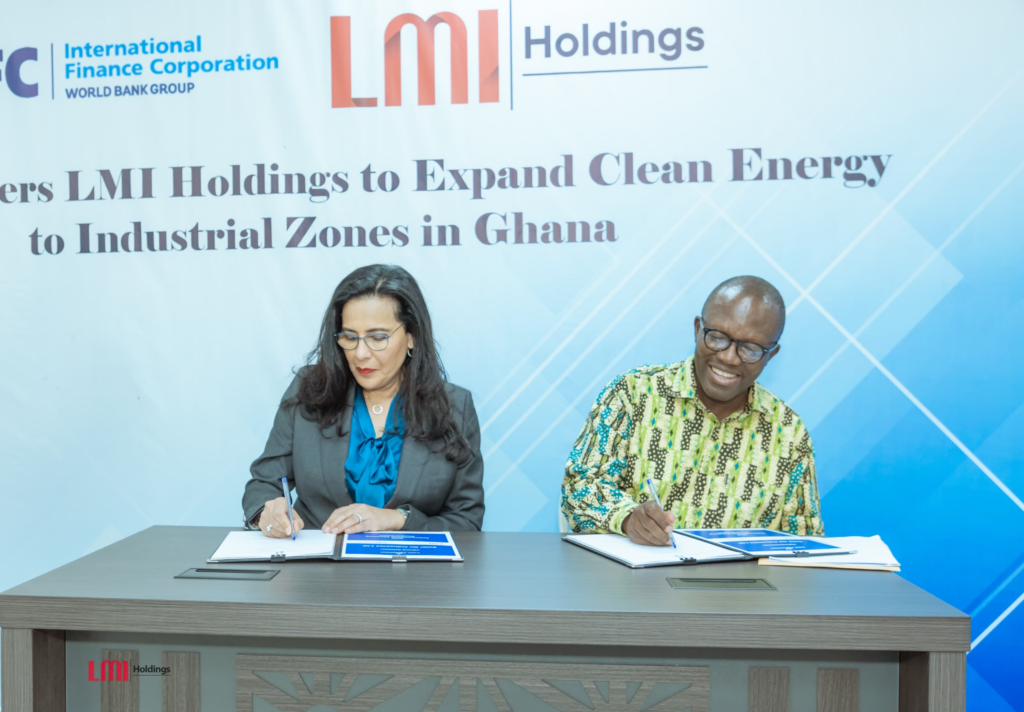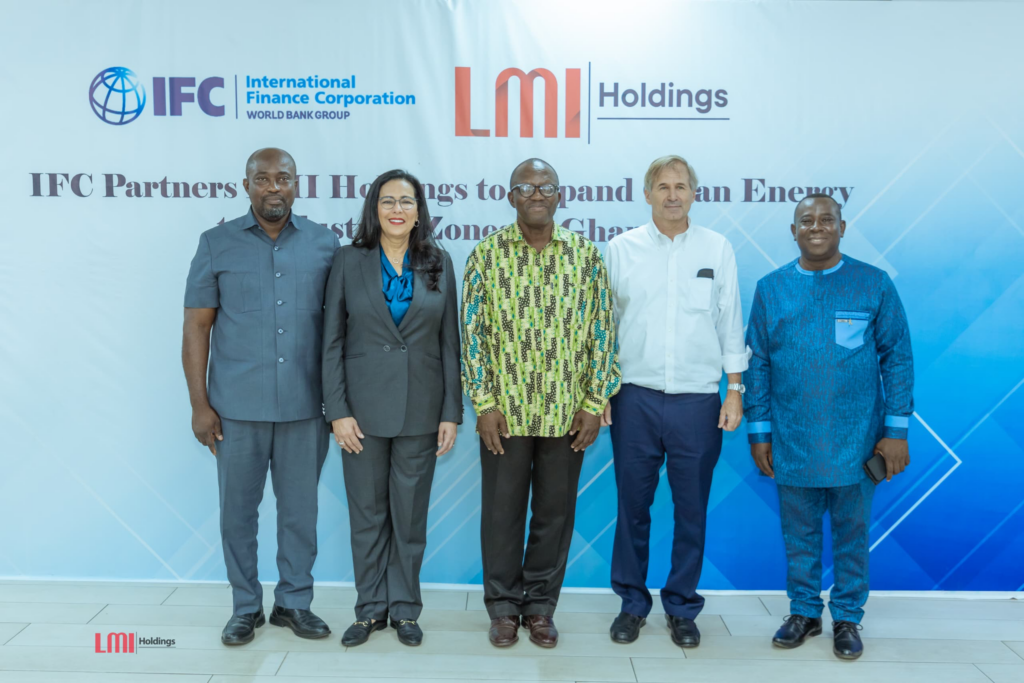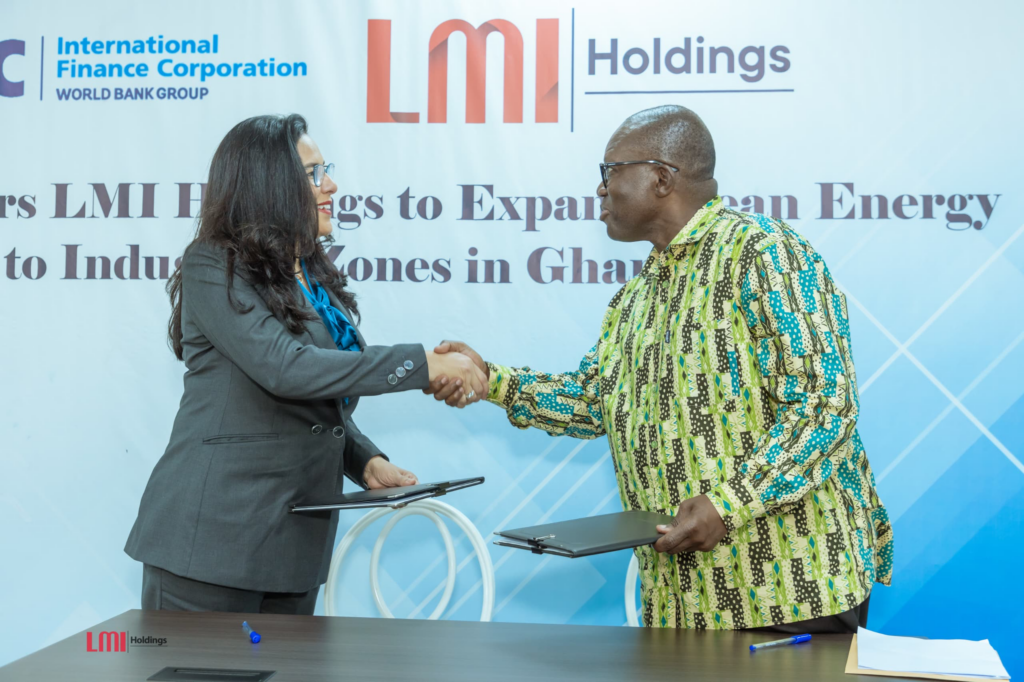From L-R: Dahlia Khalifa (IFC Regional Director for Central Africa and Anglophone West Africa), Kojo Aduhene (Group CEO, LMI Holdings) signing the loan agreement
The role of the private sector in Ghana’s quest to achieve 10% renewable energy in the energy mix is considered crucial.
Wholly owned Ghanaian company, LMI Holdings has embarked on a journey to build a 1000MW solar plant at the Dawa Industrial Park here in the Greater Accra region.
Having successfully built Africa’s largest rooftop solar project which produces about 16.8MW of power at the Tema Free Zone enclave, LMI is expected to execute a 1000MW project in phases.

Group Chief Executive Officer of LMI Holdings, Kojo Aduhene in an interview with Joy Business said work will begin in March having signed a US$100 million loan agreement with the International Finance Corporation (IFC) at Tema Free Zone enclave.
“The board of IFC in Washington has approved a facility of US$100 million to enable us to build the first 150MW of the plant”
“This will be done in two phases. The first 100MW will be completed before December 1, 2026, and the remaining 50MW before December 1, 2027. Once production starts, Enclave Power will be distributing 100% renewable power”, he said.

Mr. Aduhene believes the project can significantly improve the country’s carbon footprint making Dawa City eco-friendly.
Per the company’s schedule, the first 200MW will be ready by mid-2028 and the third 100MW will be under construction due to power demand in the enclave.
“This project is technology transfer. We are going to be teaming up with the contractors post the 200MW.
“We want to do everything ourselves in the country looking beyond the power we are generating. Consistent power supply at a reduced cost in our Dawa enclave from March will help create additional jobs”, he added.
The company is open to selling power to the wider market after achieving the 1000MW target by 2031 for industries within its Dawa enclave.
LMI has also announced a 10% discount on the price of electricity effective July 1, 2025.
General Manager for LMI Utilities, Ing. Matthew Seddoh Akatey told Joy Business, “We have already completed feasibility studies. It’s going to be a ground-mount PV system.
“The selected contractors for the project will do the engineering, a subsidiary of LMI Holdings will handle the procurement and the contractor will take care of the construction”.

He was happy the project will provide a cheaper source of power and enable companies to export and find markets around the world.
IFC Regional Director for Central and Anglophone West Africa, Dahlia Khalifa lauded the Energy Ministry for Ghana’s roadmap towards renewable energy and expressed confidence in LMI as a partner.
“Going green and being respectful of the environment is how we can be sustainable and how we’re going to be building our bottom line. The country is ahead of the curve in the green journey”, she shared.
According to her the country again is laying the groundwork for future growth.
“Talk about value chains, making more export potential a reality, see the flow of international investment and able to catch the benefits. Areas including industrial and manufacturing whether it’s in the garment, food and agro-industries and others must remain a priority”
IFC said the US$ 100 million project goes beyond providing power but jobs, enabling industrial capacities with cheaper power, lives and livelihoods it will impact.
Director for Renewable Energy at the Energy Ministry, Seth Mahu said with the country’s goal of achieving 1400MW of installed capacity by 2030, LMI’s solar project is significant.

“Your effort is significant in enabling us to achieve this goal. Transitioning can also help improve the trade environment of the country. Countries which are not able to go green will find it difficult to access such markets”, he indicated.
He assured LMI of the government’s readiness to remove regulatory barriers that prevent companies from going into production and distribution of power to support economic development.
Mr Mahu touched on the need to replicate models of LMI in other places through public-private partnerships where energy is not a component but part of a bigger economic ecosystem.
Apart from lending support, the ministry will engage LMI in creating a model that ensures industries outside the enclave access cheaper power from the project in future.
He remains hopeful completion of the project will create green jobs helping industries in the enclave remain competitive within the global production space.
DISCLAIMER: The Views, Comments, Opinions, Contributions and Statements made by Readers and Contributors on this platform do not necessarily represent the views or policy of Multimedia Group Limited.
